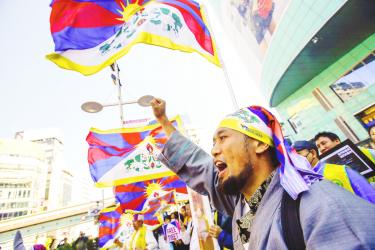About 200 people yesterday marched in downtown Taipei to commemorate the 1959 Tibetan Uprising, calling for an end to China’s oppression of Tibet.
Before the march, Tibetan rights advocates, including Democratic Progressive Party legislators Kolas Yotaka and Yu Mei-nu (尤美女), New Power Party Taipei city councilor nominee Lin Ying-meng (林穎孟) and members of the Human Rights Network for Tibet and Taiwan, the Taiwan Association for Human Rights and other groups rallied in front of a Pacific Sogo Department Store in Daan District (大安) in support of Tibetans fighting for freedom and human rights.
“On this day in 1959, tens of thousands of Tibetans — including monks, nuns and laypeople — held a peaceful protest against Chinese rule,” Tibet Religious Foundation of His Holiness the Dalai Lama chairman Dawa Tsering said.
“The Chinese government responded by launching a violent crackdown and killed many Tibetans. It was a day in Tibetan history that will always be remembered,” Dawa Tsering added.
Following the 1959 crackdown, Tibetans have continued to fight for their freedom and has organized many protests, he said.
In addition to being the 59th anniversary of the uprising, this year also marks the 30th anniversary of a 1988 movement opposing communism and the 10th anniversary of the 2008 Tibetan unrest, he added.
Since 2009, 152 Tibetans have self-immolated to protest Chinese suppression, he said, adding that on Wednesday, 44-year-old Tsekho Tugchak set himself on fire.
He expressed gratitude for people fighting for the Tibetan cause in Taiwan and around the world and called on Chinese President Xi Jinping (習近平) to review China’s Tibet policies and meet with the Dalai Lama to discuss ways to resolve problems in the region.
Taiwan Tibetan Welfare Association president Tashi Tsering also urged the Chinese government to allow Tibet’s spiritual leader to return home.
“The Dalai Lama and other Tibetans need to be able to return home,” he said, adding that they need a Tibet where the Dalai Lama lives, and where they can practice their religion and learn about their culture and language, he said.
“We want Tibet to go back to how it used to be, not the empty shell it has become,” he added.
Taiwanese must continue asking what more they can do to help Tibet, Kolas said.
Although Taiwan has in the past two years amended its Immigration Act (入出國及移民法) to allow Tibetan exiles to legally reside in the nation and has abolished the Mongolian and Tibetan Affairs Commission, “which was a remnant of colonialism,” there is still much more Taiwanese can do, she said.
Participants sang the Tibetan national anthem and walked to Taipei 101 in Xinyi District (信義), carrying a large portrait of the Dalai Lama and Tibetan snow lion flags, shouting “free Tibet.”
An exhibition on the 2008 Tibetan unrest is on display at Liberty Square until Wednesday, when another event to mark the day is scheduled to take place at the square.
Source: Taipei Times - 2018/03/11





















